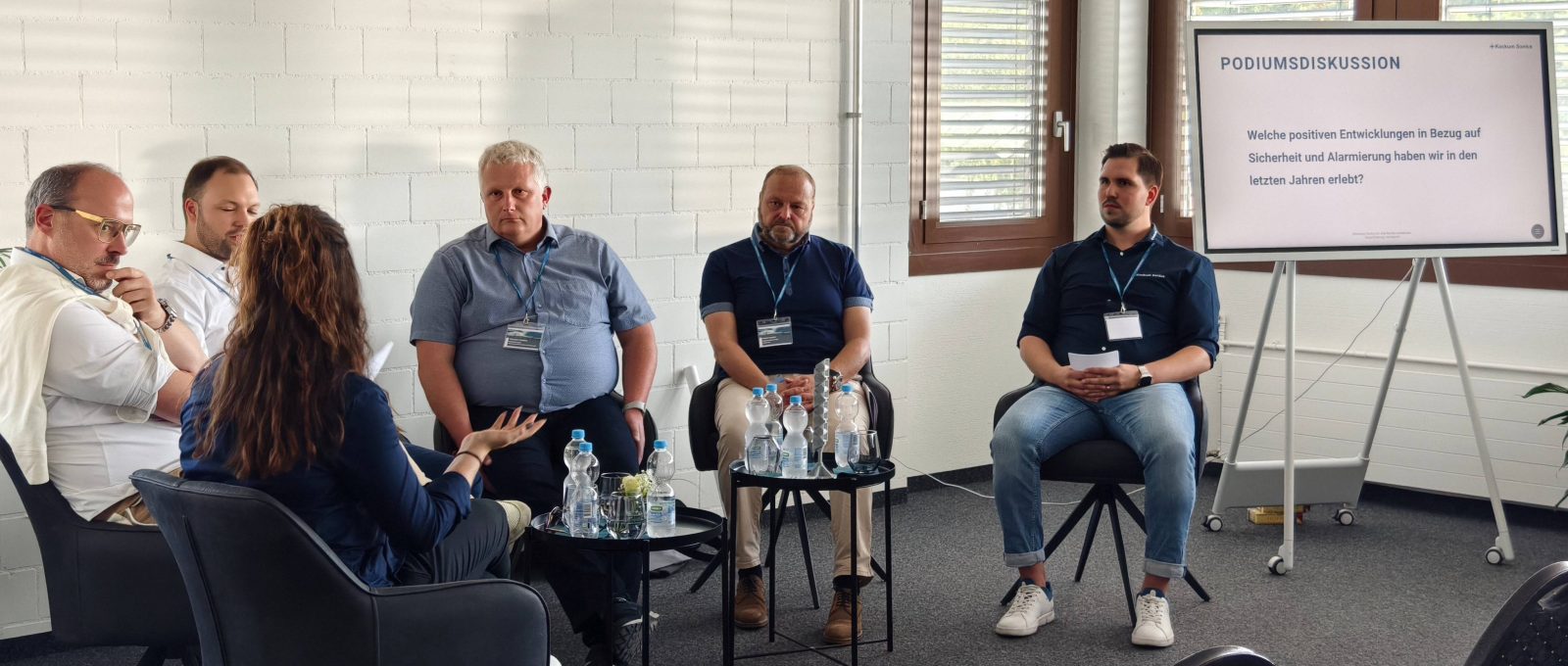Experts discuss the status quo and future prospects for civil protection and warning the population
In light of current events such as the wars in Ukraine and the Middle East, as well as the increasing number of natural disasters, the topic of security and security systems is highly topical. The reasons and the aim of disaster prevention are often the same. However, the systems and processes behind them differ significantly, even within German-speaking countries.
We took a closer look at these differences and the current state of security and alerting on the occasion of our 40th anniversary. Managing Director Kockum Sonics, Pascal Loretz, Civil Defence Officer and Cantonal Administrator of Zug, Robert Ascher and three German experts from our partner companies shared their knowledge and experience in a panel discussion. Below you will find the most important, interesting and sometimes surprising information from this exchange:
Topic: Current security situation compared to ten years ago
In Germany at the end of the 1980s and with the end of the Cold War, the usefulness of sirens was questioned and as a result, the majority of sirens were dismantled. The Ahrtal disaster of 2021, in which massive flooding killed over 135 people and caused billions in property damage, led to a nationwide rethink of security policy. Inadequate alerting and a lack of disaster prevention measures were heavily criticised.
“What once seemed unthinkable became reality three years ago – a tragedy with unimaginable consequences. The disaster in the Ahrtal shows that people often only react to dangers after a terrible event, i.e. too late and reactively. There needs to be a rethink here,’ says one of our German partners and siren project manager and explains: ’Suddenly there was a renewed awareness of safety – every municipality in our country wanted to expand its siren network. Massive subsidies led to a real boom. Many orders and few providers – you can still see that today – many projects are behind schedule because the demand is greater than the supply’.
Mr Loretz comments: “In Switzerland, we have had a well-developed siren network for decades. But I completely agree with you – I would never have thought, for example, that sirens would ever be needed again as a warning system for dangers such as war situations. As sad as it is, the war in Ukraine shows that we need to be prepared for all scenarios.”
Topic: Differences in alerting & warning between Switzerland & Germany
In Switzerland, there are only the general warning and water alarm signals – no voice alarms. The civil defence / civil protection is responsible for triggering these signals.
In Germany, there are the warning, all-clear and fire alarm signals. The use of voice alarms is also possible. The warning and all-clear signals are the warning signals of the German Civil Defence and are administered by its institutions. The fire alarm, on the other hand, is managed by the individual fire brigades and is also broadcast via their own sirens. One of the German experts states: ‘The higher number of signals is problematic, as the population is not sufficiently prepared to react to alarm signals anyway – the separate fire alarm signal leads to confusion’.
Topic: Behaviour of the population in an emergency - how well prepared are we really?
The experts agree that despite the annual siren test in Switzerland and the Federal Warning Day in Germany, there is still insufficient awareness of the correct behaviour in the event of an alarm. Questions such as ‘what does this alarm mean’, ‘how do I react in an emergency’ and ‘where can I seek shelter’ are still important issues for which more awareness needs to be created. The experts have different approaches and ideas on how this situation could be improved:
“The annual warning day is not enough to ensure urgency and an appropriate public response to an emergency. At the airport, for example, where security is known to play a major role, you have to go through a security check every time. Why don’t we put more emphasis on security awareness elsewhere? In my opinion, security awareness is part of general education. It could be moulded as early as childhood, at school. Repeated exposure to the topic, e.g. every two years, would certainly help a lot.” – opinion of German experts
However, it is not only the lack of awareness of emergencies and disasters that is problematic but also the partial lack of acceptance of the warning systems. For example, one of our partners reports that some citizens ask ‘whether the sirens can be activated quietly if they are triggered at night’. Mr Ascher from the canton of Zug says ‘that the sirens MUST be loud precisely because they are a means of raising the alarm, in order to guarantee a wake-up function’.
Topic: Use of voice messages in alerting
“Civil protection in Switzerland has three important functions in the area of safety: Alerting, warning and informing,‘ explains Mr Ascher and continues, “The ”general alarm’ signal can be used to alert and warn the population, but secondary sources such as the radio must be used to provide information. However, the provision of information on follow-up measures is at least as important for a comprehensive security system. The discussion about the use of voice cans should also be encouraged in Switzerland.”
Mr Loretz adds: “The use of canned speech and voice announcements with sirens makes sense in rural areas in particular, as there is generally not a high density of sirens here. In contrast, the use of voice announcements with sirens in urban areas can be problematic due to the high density of sirens. On the one hand, latencies can lead to a delayed playback of the voice announcement and thus to overlapping, and on the other hand, the range of voice announcements is significantly shorter than that of conventional alarm signals due to the audio frequency. But solutions can be found here too.”
The Swiss experts agree that the use of canned speech and announcements would also make sense in Switzerland – discussions on this should be encouraged in security policy.

